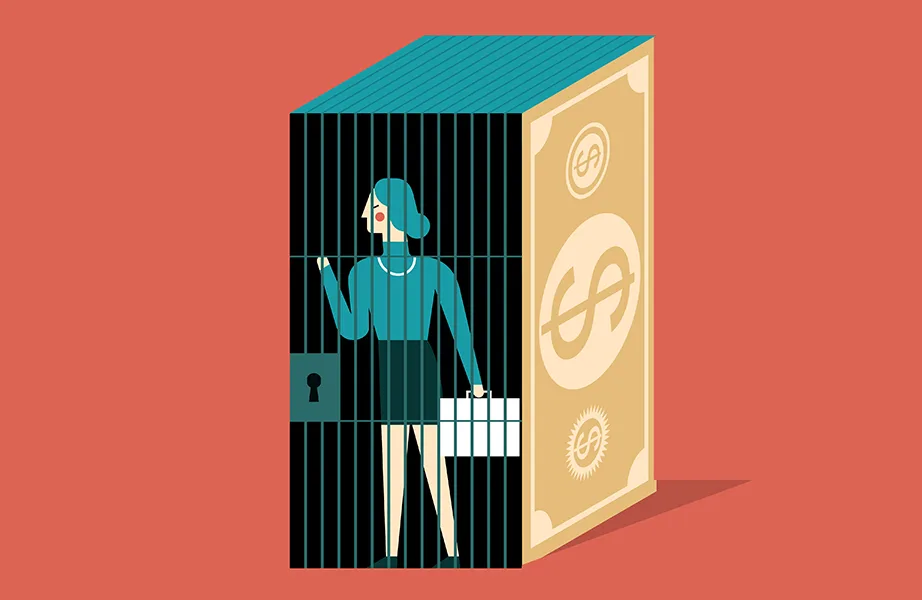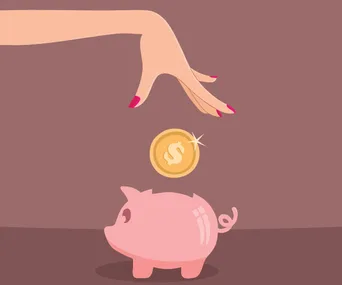
Despite the extensive campaigns dedicated toward combating domestic abuse, it remains one of the country’s biggest problems, with Australia’s domestic abuse rates alarmingly high.
On average, one woman a week is murdered by her current or former partner and one in four women have experienced emotional abuse by a partner. It’s also estimated that 16 per cent of Australian women will experience some form of financial abuse in their lifetime.
The latter doesn’t receive as much attention as domestic violence, but it’s often linked to other forms of partner abuse – and can be just as damaging and dangerous, particularly for those with fewer financial resources.
Financial abuse can happen throughout a relationship, or begin after a separation, and can be as severe as a partner taking complete control of your finances or as subtle as a partner making you feel like you’re incompetent when it comes to your personal finances.
Financial abuse comes in many shapes and forms and if you’re concerned that you, or someone you know, may be falling victim to it, here are some key signs to spot.
QUIZ: How financially literate are you? Take the quiz to see how much you know about your personal finances. If you’re looking to sharpen your finance knowledge, be sure to check out Bauer’s Financially Fit Females hub.
Financial abuse: warning signs
You can’t discuss money matters with your partner
Financial stress is currently one of the biggest causes of break-ups in Australia, affecting couples of all income levels. With housing affordability and inflation rates placing extra pressure on relationships, the inability for couples to discuss matters of money is an equal reason. However, if the inability to discuss finances is a one-sided situation, this can be a telling sign of financial abuse.
While it can sometimes prove problematic to discuss issues such as debt or mortgage repayments, those who find themselves completely unable to raise issues regarding finances with their partner could find themselves in a more dangerous position.
If your partner refuses to discuss their spending habits or is hiding information about their finances, it could have an incredibly tolling impact on you and your family. If you’re scared to discuss money as the conversation may lead to verbal and physical abuse, it might be appropriate to seek professional support and help.

Lack of communication around finances is a recurring theme among Australian couples. (Image: Getty)
You feel like you’re not allowed access to your own money
Single, dating or married, having access to your own money is a nice and necessary feeling – it brings a sense of independence. However, if your partner insists on sharing one bank account, pressuring you to close your own, this could be a huge warning sign.
While many couples and families combine finances, one bank account controlled by a single person, can be an abuse of power. What’s worse, it may lead to you having to ask for permission to have access to and use the money that you have earned.
You’re not allowed to work
Having access to your own pool of money is one of the greatest benefits of having a job – it gives you a sense of autonomy. However, this independence can be an extremely intimidating prospect for abusive partners that are looking to take control over a relationship, and your finances. Therefore, one of the most obvious and telling signs of financial abuse is a partner that is trying to restrict you or force you not to work.
Examples of this are; your partner is telling you where you can or can’t work, criticising your choice of career or pressuring you to quit your job and potentially using your children as an excuse. In more extreme cases, a partner may even harass you at work, abuse you so you are mentally or physically unable to go to work or even prevent you from going to work by hiding your keys.

If your partner prevents you from working, this could be a warning sign of financial abuse. (Image: Getty)
Your partner controls your technology
Transparency is an important aspect of a relationship, however a breach of privacy is never acceptable – whether you’re married or not. A partner that insists you share all social media and bank account passwords could be trying to execute physical and financial control over you.
Not only is this displaying a lack of trust, but giving a partner complete access to your accounts also allows them access to your hard earned money whenever they feel like, as well as the ability to monitor your spending habits. While the act may appear harmless on the surface, it can actually spark greater trust issues and cause serious conflict.
You’re not being paid child support
It’s one of the basic financial responsibilities of a separated partner who is no longer living with their children, yet child support debt in Australia is increasing yearly. Currently, outstanding payments total to a startling $1.59 billion.
While some parents are financially incapable of providing money for their kids, others are using child support as a means of expressing power and withholding financial assistance from an ex-partner. In Australia, more women than men receive child support and are therefore are at a higher risk of falling victim to the financial repercussions of unpaid child support.

Many single mothers across the country are being withheld child support payments from their ex-partner. (Image: Getty)
Financial abuse: Where can I get help?
If you identify with any of these warning signs, you may be falling victim to financial abuse. If you are in any way concerned about your situation, seek help and support.
While taking the plunge and gathering a support network can be challenging, it can be done in confidence and is the first step to regaining your financial independence. Any of these contacts will be able to provide you with confidential financial advice and support:
1800 Respect: free and confidential family violence and sexual assault counselling service
Family Relationship Advice Line: information and advice on family relationship issues and parenting arrangements after separation
Lifeline: provides crisis support services
National Debt Line: free information and resources that can help if you’re struggling with debt
.jpg?fit=900%2C753)


